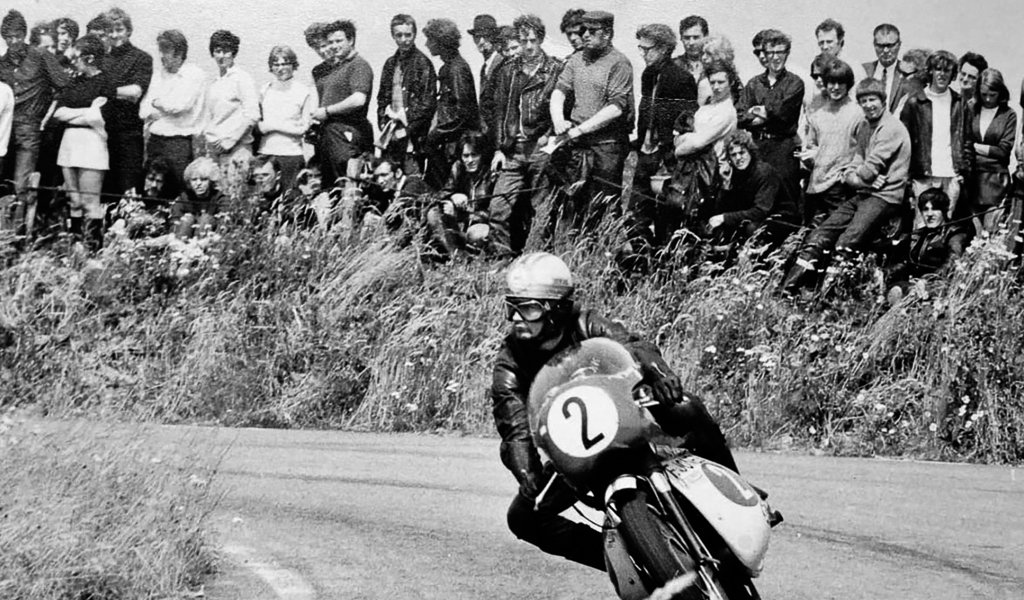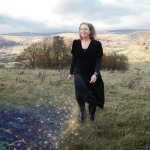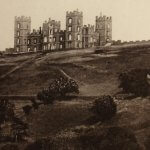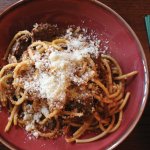As Darley Moor Motor Cycle Road Racing Club celebrates its 60th season, Fiona Stubbs learns more about the team known as ‘The Star Makers’.
ON race days, Darley Moor circuit resounds with the thunderous roar of motorbikes reaching speeds of over 200mph. My journey, however, takes a more leisurely pace with general secretary Eddie Nelson behind the wheel of his SUV. Eddie knows every inch of the mile-and-a-half tarmac track – set in 163 acres of land – and, as we drive at a snail’s pace, the stories are tumbling out.
He points out the many ways the circuit has developed over the years, including safety and noise attenuation features. All around us, there are echoes of races and racers. And, at the heart of it all, the people who, over the last 60 years, have made Darley Moor Motorcycle Road Racing Club Ltd what it is today. It’s a nostalgic yet forward-looking journey and there’s so much to take in that I request a second lap.
Adding to the intrigue is the circuit’s history as the former RAF Darley Moor. From September 1942 to February 1945, it served as a satellite to nearby RAF Ashbourne and was used as a training base for bomber pilots. It then provided storage for explosives and ammunition until the base finally closed in August 1954.
A few buildings still nod to its wartime past – along with a memorial stone unveiled last year. But it was the triangular formation of the three concrete runways which caught the eye of TT racer Don Ryder in August 1964.
“Don and his sponsor were driving past Darley Moor and spotted a British Championship Kart meeting taking place on a tiny circuit,” recounts Eddie. “They saw the potential of the three runways, met up with the landlord and suggested the site as a venue for motorcycle races.” Don went on to become chairman of the Darley Moor Motor Cycle Road Racing Club – a role which, at the age of 89, he still holds.
The first race was on April 16, 1965. But, for almost 30 years, the club was plagued with tensions around planning permissions and conditions. “At the end of 1965, the then West Derbyshire District Council issued an enforcement order prohibiting any further activities until the club built four flushing toilet blocks,” says Eddie.
“As a new club, it didn’t have the money to cover the £600 cost. So it charged racing members an extra 10 shillings (50p) per meeting – and the toilets were paid for in two months. By Easter 1966, it was able to continue racing.
“But there were ongoing battles, as the council would give only temporary consent for racing for seven years at a time, while insisting on certain conditions. We finally gained permanent permission for 14 days of racing each year – from March to October – in 1993, thanks to the actions of a new club solicitor.”
The club – run by a committee – eventually bought the circuit and, in addition to race meetings, it hosts track days where motorcyclists can hone their skills with qualified instructors. It also hosts police driver training, cycle racing, duathlon (cycle and running) events and dog agility and flyball competitions. Money earned from these commercial pursuits is invested back into the maintenance of the track and facilities.
Eddie has been general secretary since December 1983 when, following the death of his predecessor, Jim Townley, he agreed to take on the role for just 12 months.
He had been involved with the club since 1969 as a Red Cross ambulance driver on race days but admits: “I knew nothing about motorcycle racing. I’ve always had motorbikes but racing is an expensive business and something I could never afford. I agreed to take on the secretary role for a year – and it just sort of progressed from there.
“I helped the club to become profitable during my first year and, from then, I suppose I had a vision of how things could be run – and was lucky that the chairman backed me.”
He adds: “When I first came here in 1969, the clubhouse ‘facilities’ were two wallpaper tables and straw bales to sit on. There was no electric, no gas, no phones. There were hurricane lamps for lighting and a coal burning stove for warmth.”
Today, the clubhouse is a cosy, welcoming space, its walls lined with pictures of ex-champions and notable names from the world of motorcycle racing who have been associated with Darley Moor.
One features a young James Toseland, who went on to become World Superbike Champion. The picture was taken in August 1995, with 15-year-old Toseland one of the winners in the Darley Moor Junior Championship. Other notable names include former racers Bob Heath, George O’Dell, Jock Taylor, Steve Henshaw, James Whitham and Cal Crutchlow.
Current World Super Bike competitors linked with Darley Moor are twins Alex and Sam Lowes and 2023 Super Bike champion Tommy Bridewell. Tom and Ben Birchall, winners of the most sidecar awards in the TT, are club members.
So it’s little surprise that, since 1969, Darley Moor has been known as ‘The Star Makers’. Each October the club runs its ‘Stars at Darley’ meeting, attracting British Super Bike racers who take part in special invitation races.
One regular returner is TT specialist John McGuinness, who has won the Isle of Man race 23 times. “He first raced at Darley Moor in 1991, his second season of racing,” says Eddie. “He’s been to every ‘Stars at Darley’ meeting since 1998 and still supports the club.”
It’s believed that Darley Moor can boast the most TT awards of any club, though a lack of early records means the exact number is unknown. However, the design of the track was widely acknowledged as good preparation for anyone taking on the gruelling TT circuit on the Isle of Man. Eddie reveals: “In the old days, if you could ride Darley Moor, you could complete the TT.”
Veteran racer Walter Wooliscroft was a stalwart of the club. “Even in his 70s, he’d ride his old Enfield in races here, happy to be at the back,” recalls Eddie. “When he stopped racing, aged 76, he’d come and spend a Sunday with a sickle, clearing the bank so that spectators could see over it.”
That kind of commitment remains very much at the heart of the club. Sections of the circuit are named in honour of people who have helped to shape it over the years. These include the Wilson Chicane, in memory of supporters Jack and Esther Wilson and of Jack’s son Allan and his wife Joyce.
Eddie explains: “Allan worked at Rolls Royce and, when he was made redundant, would live up here for weeks on end with his wife, cutting the grass, painting, doing whatever needed doing, generally looking after the place.” Allan and Joyce’s children, David, Philip and Keith, are still involved with the club.
“The vast majority of maintenance is done by volunteer helpers,” adds Eddie. “In the old days, it was a condition for spectators that you had to take a black bag of litter home with you. Now local scouts collect litter and in return we give a contribution to their funds and they use our campsite for their camps.”
As the club prepares for the new season, even a local flock of sheep is getting involved – grazing the spectator banking to keep down the grass!
Throughout his early days as secretary, Eddie was grateful for support from the Auto-Cycle Union (ACU), the national governing body for motorcycle sport in England, Wales and Scotland. He went on to become Road Race manager for the ACU, which represents 550 clubs, covering over 3,000 events each year.
Meanwhile, he’s helped to steer Darley Moor though financial challenges such as the 2001 Foot and Mouth outbreak – which forced cancellation of meetings – and Covid-19. “During the recent pandemic, my average working week was 96 hours – with all the new protocols and paperwork that kept coming through,” recalls Eddie. “I handled 49 separate risk assessments – and we were closed!”
As the club’s 60th year gets underway – starting with an anniversary race meeting on April 14 and culminating with an anniversary dinner on 25th January – Eddie is engaged in succession planning.
Throughout his tenure, he has been supported by his wife, Christine, and their daughter Sandra. Now he is keen for younger members to take the club forward and Sandra has recently been employed as club administrator, with a view to eventually taking over Eddie’s secretary role.
“Motorsport is dangerous, so there’s a lot of paperwork and planning,” says Eddie. “The task of general secretary is huge now compared to what it was, in terms of health and safety, noise, etc.
“Sandra has been around the club since she was three months old. I remember when she was little, my predecessor, Jim Townley, picked her up and said to everyone: ‘This is Sandra – she is the new Darley Moor. I predict that in 50 years she will still be here.’ And she is!”
Editor’s Note: Learn more at https://www.darleymoor.co.uk The Chequered Flag café at Darley Moor has been revamped under the management of local couple, Craig and Samantha Francis. It is open for all events and every Saturday, Sunday and Bank Holidays.






